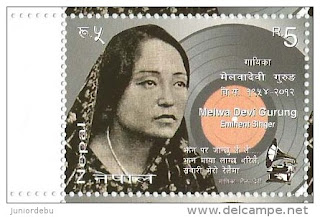| His Imperial Highness Archduke Franz Ferdinand with Her Serene Highness Princess Sophie |
The Archduke had a morganatic wedding with Sophie Chotek in 1899, who he met at a ball in 1894. The marriage meant that Sophie couldn't be seen in public functions anywhere near the Archduke when in royal duty, because of her non-royal lineage. The only exception was when he was fulfilling his military duties. So, under the pretext of inspecting the Serbian army, the Archduke went to meet his death, But, 21 years before he was shot in the neck by Gavrilo Princip, he came to Nepal to shoot tigers ( March, 1893 )
Shree Teen Maharajah Bir Shumsher was the lone tiger in the huge forest of Nepal in 1893. With the threat of Khadga Shumsher completely eliminated, Maharajah Bir was enjoying his supreme rule over Nepal. His simple-minded brother Dev Shumsher was next-in-line, while the cunning Chandra Shumsher was the Jungi-Laath and the Western Commanding General. At that time, Nepal had no formal ties with any country except for Great Britain. Archduke Ferdinand was also on a trip around the globe. In 1893, he first reached India, where he was received by the Maharajahs and Nawabs. After almost a month in India, the Archduke expressed his desire to hunt tigers in Nepal.
The Archduke's wish desire was met with a great difficulty in the Lal Durbar. Because of the pressure to maintain close ties with Britain and the East-India Company, the Mahrajah couldn't welcome the Archduke in person, nor could he send one of his "rolewallah" brothers (included in the roll of succession), lest the Viceroy be provoked. Then, it was decided to send Commanding Colonel Keshar Singh Thapa, the maternal uncle of four brothers; Khadga, Dev, Chandra and Bhim. Keshar Singh Thapa was exiled from Kathmandu and was sent to live in Salyan as its Bada-Hakim (Chief Administrator). So, it was decided, Commanding Colonel Keshar Singh Thapa would be the chief of the organizing party, and his son Captain Prem Shumsher Thapa his assistant.
| The hunting party of Archduke Franz Ferdinand in Nepal. He is pictured holding a rifle. |
In the month of march in 1893, the Archduke Franz Ferdinand came to Nepal and shot animals in Kailali and Kanchanpur. During his hunt, a total of 17 tigers, 6 leopards, and many swamp deers, boars, antelopes, spotted deers and blackbucks were shot. Pleased with the hunt and the hunting party, Archduke Ferdinand, he gifted C.Col. Keshar Singh Thapa a Qatari sword with its scabbard with the royal monogram upon it and fourteen guns; while Capt. Prem Shumsher Thapa was also gifted a sword. He also sent a letter to Maharajah Bir (via Keshar Singh Thapa) thanking him for the hunt and also requested for his autographed potrait, to which Bir graciously acquiesced.
The same Archduke was assassinated 21 years later in Serbia, by Gavrilo Princip. That assassination is regarded as the trigger for World War I.

